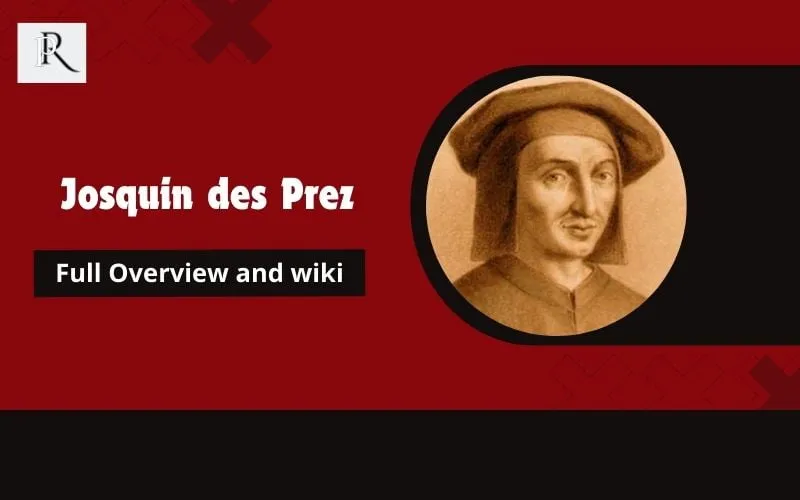Josquin des Prez, a great Renaissance figure, not only shaped musical history but also has a fascinating financial legacy. Learn about Josquin des Prez net worth and how it reflects the economic and cultural context of his time.
Quick information
| TRUTH | DETAIL |
| Real name | Josquin Lebloitte of Prez |
| Popular name | Josquin des Prez |
| Sex | male |
| Date of birth | c. 1450-1455 |
| Year old | Died at age 66-71 (August 27, 1521) |
| Parents | do not apply |
| Siblings | do not apply |
| Place of birth | Hainaut, present-day Belgium |
| Nationality | Franco-Flemish |
| Nation | Flemish |
| Education | Potentially trained at Cambrai Cathedral |
| Marital status | do not apply |
| Sexual orientation | do not apply |
| Wife/Wife/husband | do not apply |
| Children | do not apply |
| Dating | do not apply |
| Net value | do not apply |
| Origin of wealth | Music composition, sponsorship |
| Height | do not apply |
What is Josquin des Prez 2024 net worth?

In 2024, assessing the net worth of Josquin des Prez, a Renaissance composer, poses a special challenge due to the era in which he lived.
Obviously, financial records from the 1500s do not translate directly to today’s currency or economic landscape. However, comparing his status in modern terms, Josquin could be considered quite wealthy for his time, thanks to royal and aristocratic patronage.
In contrast to his contemporaries Giovanni Pierluigi da PalestrinaJosquin probably had a similar economic position, given their prominence in the musical world of Renaissance Europe.
Both are highly regarded by their patrons, but direct financial comparisons remain speculative without concrete records.
Josquin des Prez Full overview and Wiki

Life and times
Let’s delve into the world of Josquin des Prez, a Renaissance master whose life reads like a novel. Born around the mid-15th century in what is now Belgium, Josquin spent his early years in Europe with a burst of artistic and musical creativity.
As a central figure of the Franco-Flemish School, he not only absorbed the rich cultural influences around him but also helped define the nature of Renaissance music.
Contribution to polyphonic music
Josquin is to polyphony what Shakespeare is to drama. He took a complex musical technique and turned it into an art form that would resonate through the ages.
His approach involves intricate layering of independent vocals, a method that makes his music stand out for its depth and emotional resonance. This was a game changer, setting the stage for future composers to build on his groundbreaking work.
The main projects
From hauntingly beautiful blocks to motifs that blend the spiritual and the sublime, Josquin’s portfolio is nothing short of stellar.
Works as Ave Maria… Virgo serena And Missa de Beata Virginia demonstrates the skill of combining text with music, creating works that not only please the ear but also move the soul.
Each composition serves as a window into a time when music was as much about innovation as it was devotion.
Influenced later composers and European music
Josquin’s influence extended far beyond the borders of Flanders. His style and technique spread throughout Europe, laying the foundation for other musical giants like Palestrina and influencing countless others.
His ability to seamlessly combine complex vocals with lyrical clarity has made his music a cornerstone for the study of Renaissance works.
Heritage in modern music
Fast forward to today, Josquin’s music still holds a highly regarded place in musicology. A revival of interest in early music brought his compositions back to concert halls and academic studies, highlighting his role in shaping Western music.
His work is not just performed; they are revered as masterpieces of polyphonic music.
In the digital age: Recording and interpretation
In the digital age, Josquin’s music has found a new audience. Recordings of his works have made them accessible worldwide, allowing both connoisseurs and curious listeners to explore the rich textures of Renaissance music.
Modern interpretations continue to breathe life into his compositions, ensuring that his legacy will endure, echoing through the ages as beautifully as the notes he wrote.
Frequently asked questions

Who is Josquin des Prez?
He was a French-Flemish composer of the Renaissance, celebrated for his significant contributions to music in the 15th and early 16th centuries. He was known for his masses, motets and chansons.
When and where was Josquin born?
Josquin was probably born around 1450-1455 in the area that today corresponds to modern-day Belgium, specifically in or near Condé-sur-l’Escaut in Burgundian Hainaut, now part of France.
What are some of Josquin’s most famous works?
Some of Josquin’s most famous works include Ms. Pange’s language, Ave Maria… virgin serenaAnd Mille regrets. These works demonstrate his mastery of polyphony and expressive lyricism.
Does Josquin have any notable patrons?
That’s right, King Louis XII of France recognized Josquin’s talent, granting him a lifetime pension and title Maître de Chapelle.
What is unique about Josquin’s compositional style?
Josquin is credited with being a pioneer parody volumea form of mass composition in which existing secular or sacred compositions form the basis of the mass.
How does Josquin’s music reflect the intellectual current of the Renaissance?
His compositions often reflect Renaissance ideals of proportion, balance and symmetry, interwoven with humanistic and pious themes.
What is the controversy surrounding Josquin’s music?
Josquin’s identity and his work are the subject of scholarly debate. Many compositions were attributed to him to capitalize on his fame, and only meticulous scholarship has begun to clarify his actual catalog.
How is Josquin’s music perceived and performed today?
Josquin remains a central figure in Renaissance music, with performances and recordings mainly by early music specialists. The 500th anniversary of his death in 2021 is marked by many global musical tributes.
Where can one find recordings or performances of Josquin’s works?
Recordings of Josquin’s works are widely available through classical music platforms and performed by ensembles specializing in Renaissance music, such as the Tallis Scholars and others focused on into early music.
Conclusion
We explore how Josquin des Prez not only shaped the world of music but also how he stood financially among the influential instrumentalists of his time. For more fascinating historical reviews and musical insights, follow Da Nang Polytechnic.com.
Categories: Musician
Source: dut.edu.vn






